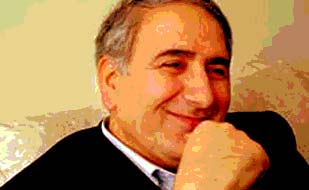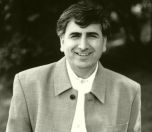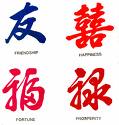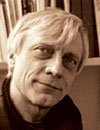After being treated for stomach cancer for a long time, Kurdish writer Mehmed Uzun died in Diyarbakir (south-eastern Turkey) yesterday. His funeral will be on 13 October.
Return to Diyarbakir last year
Uzun had been living in Sweden since 1977, but had returned to Diyarbakir last year in order to continue his cancer treatment there. On his return, he said:
"I am telling all the world. In my world there is now not a hospital in Boston, nor in Sweden. From now on there is Diyarbakir. [...] Diyarbakir has always had a special place in my heart. This is also true in my literature, in what I have written. And now I am together with you again in Diyarbakir. I am on my soil. All that I have written I have written for the Kurdish people, for you. I call on the world through you."
Uzun has written about 20 books in Kurdish, Turkish and Swedish, and his books have been translated into many languages. His novels were written in Kurdish.
"Moral support of my people"
The Istanbul branch of the Human Rights Association (IHD) said that when he was close to death, Uzun said about his return to Diyarbakir: "I was sure that the soil of Upper Mesopotamia and Diyarbakir would bring me health. I have survived until today because of the moral support of my people." He added in Kurdish, "Ez qurbana wan im", meaning, "Let me be sacrificed to them", which is both a traditional way of expressing love, and here a poignant reflection on his return.
Uzun had spoken at the conference in January 2007, entitled, "Turkey is Looking for Peace". He had said in the closing speech:
"Our topic is peace, and I believe that anyting to do with peace has to be started optimistically."
Because of his illness, Uzun had not been able to attend the conference personally, but his speech was read out. He also said:
"Peace is the most virtuous thing"
"Peace is the most important, the most virtuous work of humans. There are no immortal individuals, but there are immortal works of individuals and there are immortal people created from these works. We have known this since Gilgamesh. Peace is not only an immortal work, but it is the most virtuous thing created by the human mind. Because peace is a wonderful humane transformation. Peace is [...] forming an equal relationship with the other in order to understand him/her."
IHD: A great loss
Emphasising Uzun's contribution to Kurdish literature, the IHD mourned the loss of "a peace volunteer, a human rights activist, a person of literature and a friend".
"With great sorrow we express our condolences to Kurds, Turks, Armenians, Syriac Christians and Keldanis, in short all the people who live in this region."
DTP: He wrote in a language people did not think one could write in
The pro-Kurdish Democratic Society Party (DTP) read a press statement at its headquarters, saying:
"We are deeply saddened by the death of Mehmed Uzun. This is a big loss not only for Kurds, but also for Turkey. With his death, world literature has lost a trilingual writer."
"Although he lived in exile, he worked and produced a lot. He made sure that Kurdish, of which it was said that one could not have a literature or novels in it, met with world literature. His life has been the accumulation of many difficult years of introducing a forbidden language and culture to the human family."
"The literary inheritance that Mehmed Uzun leaves us is Kurdish literature's revolt and response to 100 years of Turkification policies."
Uzun: Used to court rooms, not conferences
At a conference given in his honour in Istanbul in February 2007, Uzun had said: "I am used to court rooms, I am not used to these kind of conference rooms. Most of what I have said about my books has been said in court rooms. Today my writing is being discussed from a different angle. For the first time my books, my writing is being discussed at such a scientific venue. Let it be the first, but not the last time. When those who are prosecuted for their writings are evaluated scientifically, then both they and the university get in touch with their real identity."
Who is Mehmed Uzun?
Uzun was born in 1953 in the Kurdish province of Şanlıurfa. He went into exile to Sweden in 1977. His books, which he wrote in Kurdish, Turkish and Swedish, have been published in 20 languages. Uzun was prosecuted in Turkey for many of his novels.
The novelist was an active member of the Swedish PEN and International PEN, and was a member of the management board of the Swedish Writers' Association.
He was a member of Association of World Journalists. He received the Freedom of Thought and Speech Award from the Turkish Publishers Association.
He received the Berlin Kurdish Institute Literature Award and one of the most important awards in Scandinavia, the Torgny Segerstedt Freedom Pen Award. The Swedish Academy awarded him the Stina-Erik Lındeberg Award in 2002. (TK/NZ/AG)
* The biographical information has been taken from the Turkish Daily News.















